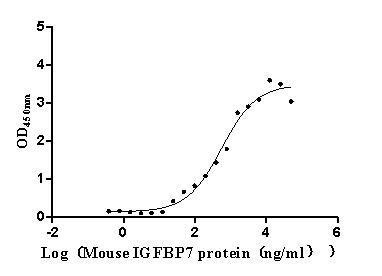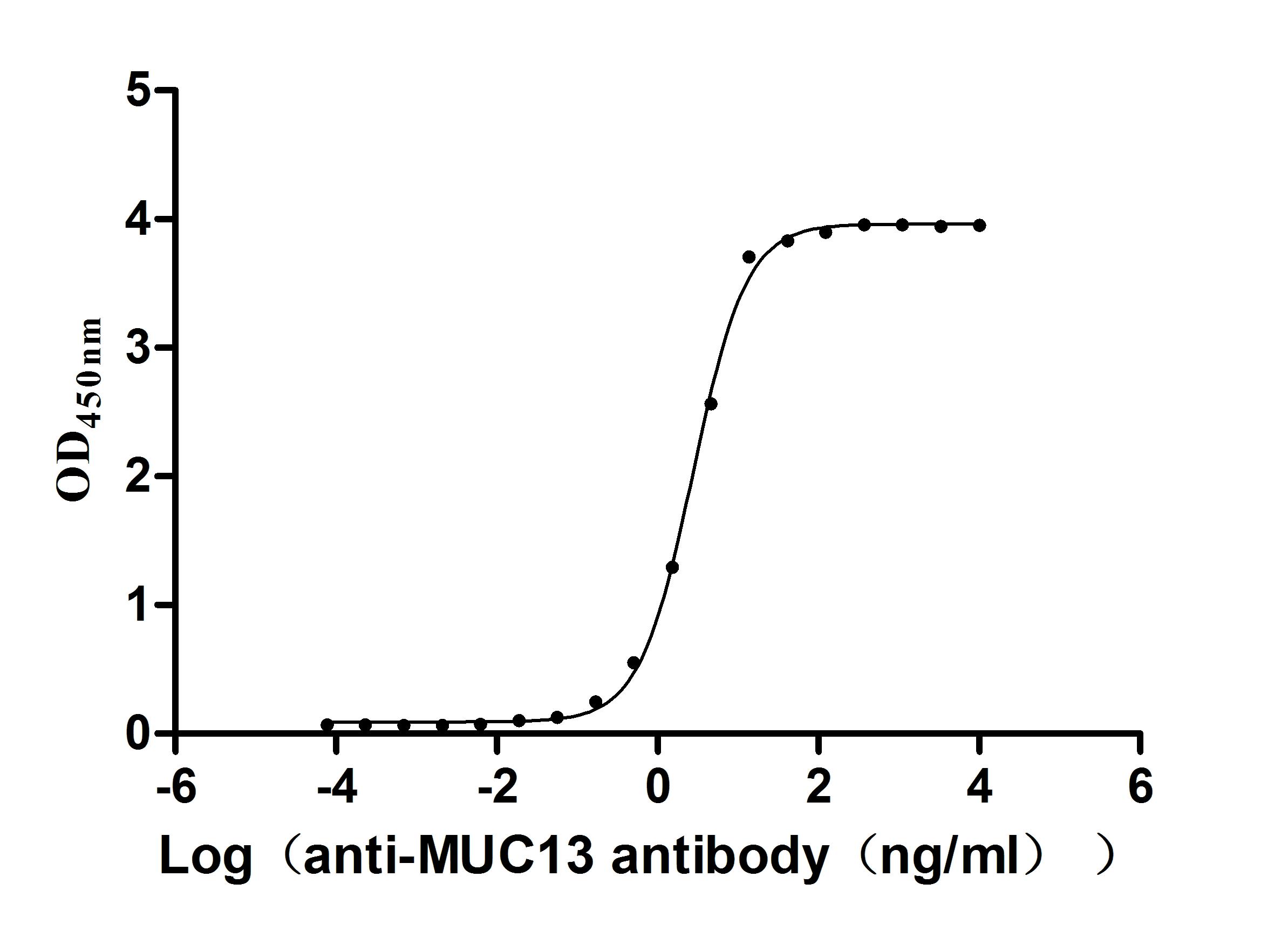Recombinant Human Serine/arginine-rich splicing factor 1 (SRSF1)
In Stock-
中文名称:人SRSF1重组蛋白
-
货号:CSB-EP021142HU
-
规格:¥1344
-
图片:
-
其他:
产品详情
-
纯度:Greater than 90% as determined by SDS-PAGE.
-
基因名:
-
Uniprot No.:
-
别名:Alternative splicing factor 1; Alternative-splicing factor 1; arginine/serine-rich 1; ASF 1; ASF; ASF-1; ASF1; FLJ53078; MGC5228; P33 subunit; Pre mRNA splicing factor SF2 P33 subunit; pre-mRNA-splicing factor SF2; Serine/arginine-rich splicing factor 1; SF2; SF2P33; SFRS1; Splicing factor 2 alternate splicing factor; Splicing factor 2; Splicing factor; Splicing factor arginine/serine rich 1; SR Splicing factor 1; SRp30a; srsf1; SRSF1_HUMAN
-
种属:Homo sapiens (Human)
-
蛋白长度:Full Length of Mature Protein
-
来源:E.coli
-
分子量:43.6kDa
-
表达区域:2-248aa
-
氨基酸序列SGGGVIRGPAGNNDCRIYVGNLPPDIRTKDIEDVFYKYGAIRDIDLKNRRGGPPFAFVEFEDPRDAEDAVYGRDGYDYDGYRLRVEFPRSGRGTGRGGGGGGGGGAPRGRYGPPSRRSENRVVVSGLPPSGSWQDLKDHMREAGDVCYADVYRDGTGVVEFVRKEDMTYAVRKLDNTKFRSHEGETAYIRVKVDGPRSPSYGRSRSRSRSRSRSRSRSNSRSRSYSPRRSRGSPRYSPRHSRSRSRT
Note: The complete sequence including tag sequence, target protein sequence and linker sequence could be provided upon request. -
蛋白标签:N-terminal 6xHis-SUMO-tagged
-
产品提供形式:Liquid or Lyophilized powder
Note: We will preferentially ship the format that we have in stock, however, if you have any special requirement for the format, please remark your requirement when placing the order, we will prepare according to your demand. -
缓冲液:Tris-based buffer,50% glycerol
-
储存条件:Store at -20°C/-80°C upon receipt, aliquoting is necessary for mutiple use. Avoid repeated freeze-thaw cycles.
-
保质期:The shelf life is related to many factors, storage state, buffer ingredients, storage temperature and the stability of the protein itself.
Generally, the shelf life of liquid form is 6 months at -20°C/-80°C. The shelf life of lyophilized form is 12 months at -20°C/-80°C. -
货期:3-7 business days
-
注意事项:Repeated freezing and thawing is not recommended. Store working aliquots at 4°C for up to one week.
-
Datasheet & COA:Please contact us to get it.
相关产品
靶点详情
-
功能:Plays a role in preventing exon skipping, ensuring the accuracy of splicing and regulating alternative splicing. Interacts with other spliceosomal components, via the RS domains, to form a bridge between the 5'- and 3'-splice site binding components, U1 snRNP and U2AF. Can stimulate binding of U1 snRNP to a 5'-splice site-containing pre-mRNA. Binds to purine-rich RNA sequences, either the octamer, 5'-RGAAGAAC-3' (r=A or G) or the decamers, AGGACAGAGC/AGGACGAAGC. Binds preferentially to the 5'-CGAGGCG-3' motif in vitro. Three copies of the octamer constitute a powerful splicing enhancer in vitro, the ASF/SF2 splicing enhancer (ASE) which can specifically activate ASE-dependent splicing. Isoform ASF-2 and isoform ASF-3 act as splicing repressors. May function as export adapter involved in mRNA nuclear export through the TAP/NXF1 pathway.
-
基因功能参考文献:
- SRSF1 promotes vascular smooth muscle cell (VSMC) proliferation and injury-induced neointima formation. SRSF1 favors the induction of a truncated p53 isoform, Delta133p53, which has an equal proliferative effect and in turn transcriptionally activates Kruppel-like factor 5 (KLF5) via the Delta133p53-EGR1 complex, resulting in an accelerated cell-cycle progression and increased VSMC proliferation. PMID: 28799539
- repeat RNA-sequestration of SRSF1 triggers the NXF1-dependent nuclear export of C9ORF72 transcripts retaining expanded hexanucleotide repeats PMID: 28677678
- A -44 G to A "hot zone" putative functional noncoding variant of SRSF1 was found in an AML patient. It alters the binding activities of E2F6, ELF1, and ELK4, ELK4. PMID: 29764005
- We now show that the ability of SRPK1 to mobilize SRSF1 from speckles to the nucleoplasm is dependent on active CLK1. Diffusion from speckles is promoted by the formation of an SRPK1-CLK1 complex that facilitates dissociation of SRSF1 from CLK1 and enhances the phosphorylation of several serine-proline dipeptides in this SR protein PMID: 29335301
- s showed that Mir505-3p was capable of inhibiting tumor proliferation driven by SRSF1 in two neural tumor cell lines, Neuro-2a (N2a) and U251, exclusively in serum-reduced condition. s observed that the protein level of SRSF1 was gradually promoted by increasing concentration of serum. PMID: 29120871
- The present study suggested that the tumor suppressor miR30c may be involved in prostate cancer tumorigenesis, possibly via targeting ASF/SF2. PMID: 28677791
- It has been proposed that SF2/ASF has a protective role against JC virus reactivation in multiple sclerosis patients. PMID: 27812788
- Immune suppression of JC virus gene expression is mediated by SRSF1. PMID: 26951564
- ASF/SF2 is identified as a splicing regulator of cyclin T1, which contributes to the control of the subsequent transcription events. PMID: 28422315
- Findings suggest MALAT1 increases AKAP-9 expression by promoting SRPK1-catalyzed SRSF1 phosphorylation in CRC cells. These results reveal a novel molecular mechanism by which MALAT1 regulates AKAP-9 expression in CRC cells. PMID: 26887056
- high level of SF2, as a novel oncoprotein in RCC, was significantly associated with poor survival in a large cohort of RCC specimens. Taken together, our study presents a road map for the prediction and validation of miR-766-3p/SF2 axis and thus imparts a therapeutic way for further RCC progression. PMID: 28657135
- We present a joint atomistic molecular dynamics (MD) and experimental study of two RRM-containing proteins bound with their single-stranded target RNAs, namely the Fox-1 and SRSF1 complexes.The simulations predict unanticipated specific participation of Arg142 at the protein-RNA interface of the SRFS1 complex, which is subsequently confirmed by NMR and ITC measurements PMID: 27193998
- Using NMR spectroscopy with two separately expressed domains of SRSF1, we showed that several residues in the RNA-binding motif 2 interact with the N-terminal region of the RS domain (RS1). PMID: 27091468
- Especially, in SRSF1 morphants, bone cartilage formation was reduced in the brain and Nkx-2.5 expression was dramatically reduced in the heart of SRSF1 morphants. In addition, a dramatic reduction in functional chordin RNA in SRSF1 morphants was observed suggesting that chordin is one of the targets of SRSF1. Thus, we concluded that SRSF1 is an essential factor for pattern formation including heart, cartilage and germ lay PMID: 27396620
- results strongly support SRSF1 as a prognostic biomarker in SCLC and provide a rationale for personalized therapy in SCLC PMID: 27093186
- NSrp70 acts as a new molecular counterpart for alternative splicing of target RNA, counteracting SRSF1 and SRSF2 splicing activity. PMID: 26797131
- we have identified for the first time a potential mechanism that involves the essential splicing factor ASF/SF2 through which morphine regulates splicing specificity of the MOR encoding gene, OPRM1. PMID: 26553431
- Global splicing analysis with RNA-seq revealed that exons carrying the hnRNP H-binding GGGGG motif are predisposed to be skipped compared to those carrying the SRSF1-binding GGAGG motif in both human and mouse brains. PMID: 26282582
- We present experimental evidence that splicing factor SRSF1, SRSF2, U2AF35, U2AF65 and KHSRP expression levels in gastrointestinal tract (colon, gastric and pancreatic) tumors differ compare to healthy tissues and in cell lines PMID: 26406946
- These findings have revealed a molecular interplay between cellular SRSF1 and viral T-antigen in controlling JC virus gene expression. PMID: 26596376
- These include alternative splicing of SRSF1 itself. PMID: 26273603
- SF2 contributes to the elevated levels of ERK activation in hepatocellular carcinoma cells through modulating key component(s) downstream of growth factor receptors and upstream of ERK. PMID: 26018840
- These results suggest that MALAT1 may function as a promoter of gastric cancer cell proliferation partly by regulating SF2/ASF. PMID: 24857172
- SRSF1 regulates CD3zeta expression in human T cells and may contribute to the T cell defect in systemic lupus erythematosus. PMID: 26134847
- serine/arginine-rich splicing factor 1 (SRSF1) could specifically interact with RIG-I to facilitate RIG-I mediated production of type-I IFN that is triggered by cytosolic DNA. PMID: 25658361
- Using RNA-sequencing and 3-D cell cultures that mimic breast cancer, the s identified SRSF1-regulated alternative splicing targets that are candidates for mediating SRSF1's oncogenic functions in mammary cells. PMID: 26431027
- The accumulated knowledge about SRSF1 provides critical insight into the integral role it plays in maintaining cellular homeostasis and suggests new targets for anticancer therapy. PMID: 24807918
- Data suggest that proline phosphorylation by CLK1/CDC-like kinase 1 (but not by SRPK1/serine/arginine-rich splicing factor kinase 1) regulates conformation and alternative splicing function of SFRS1 (serine/arginine-rich splicing factor 1). PMID: 25529026
- SRSF1 is a critical regulator that controls both RNA splicing and stability in the nucleus and functions in a Malat1-dependent manner. PMID: 24468535
- upon T cell activation, SRSF1 becomes limiting, and its function in CD6 exon 5 splicing is countered by an increase in CD6 transcription, dependent on chromatin acetylation. PMID: 24890719
- Data indicate that armadillo repeat protein ARVCF interacts with the splicing factors the splicing factor SRSF1 (SF2/ASF), the RNA helicase p68 (DDX5), and the heterogeneous nuclear ribonucleoprotein hnRNP H2. PMID: 24644279
- In the broader context of cancer pathology, the results suggest that SRSF1 might play a central role not only in the tumor cells, but also in the surrounding stroma. PMID: 23966470
- results demonstrate a novel mechanism of regulation of the splicing factor SRSF1 in human T cells and a potential molecular mechanism that controls its expression in SLE. PMID: 24368769
- Identification of new splicing events regulated by the oncogenic splicing factor SRSF1 in lung cancer using novel analytical tool. PMID: 24371231
- Specific induction of AS2 due to Alternative splicing is associated with epithelial ovarian cancer. PMID: 23748175
- Overexpression of SRSF1 and SRSF9 promote beta-catenin accumulation via the recruitment of beta-catenin mRNA and by enhancing its translation in an mTOR-dependent manner. PMID: 23592547
- The data establish a new view of SRSF1 protein regulation in which SRPK1 and CLK1 partition activities based on Ser-Pro versus Arg-Ser placement rather than on N- and C-terminal preferences along the RS domain. PMID: 23707382
- our results indicate that ASF/SF2 binds to a purine-rich region distant from both the previously published initiation site of HDV mRNA transcription and binding site of RNAP II, and suggest that this protein is not involved in HDV replication PMID: 23349975
- a new mechanism of posttranscriptional regulation of DIO1 and show deregulation of DIO1 expression in pituitary adenoma, possibly resulting from disturbed expression of SF2/ASF. PMID: 23462647
- High expression of ASF is associated with chronic myeloid leukemia. PMID: 23228155
- Results indicate that SF2/ASF regulates IL-2 production and that decreased SF2/ASF expression in systemic lupus erythematosus (SLE) T cells contributes to deficient IL-2 production. PMID: 23319613
- Results indicate that SRSF1 serves as an anti-apoptotic factor and potentially contributes to leukemogenesis in pediatric ALL patients by cooperating with PRMT1. PMID: 22839530
- Data indicate that depletion of SRSF1 in human cells compromises the association of splicing factors to nuclear speckles and influences the levels and activity of other SR proteins. PMID: 22855529
- SRSF1 is a direct target of the transcription factor oncoprotein MYC. PMID: 22545246
- Overexpression of SRSF1 rescues apoptosis of MCF-7 cells induced by Pnn depletion. PMID: 22454513
- In three-dimensional (3D) culture, SRSF1-overexpressing MCF-10A cells formed larger acini than control cells, reflecting increased proliferation and delayed apoptosis during acinar morphogenesis. PMID: 22245967
- ASF/SF2 translocates to the cytosol and regulates the alternative splicing of endoglin during senescence of endothelial cells. PMID: 21668763
- a novel intronic splicing enhancer that regulates caspase 9 RNA splicing and specifically interacts with SRSF1 was identified. PMID: 21622622
- negative regulation of the JC virus promoter by SF2/ASF may control reactivation of JCV replication in brain PMID: 21297941
- phosphorylation of the RS domain in SRSF1 induces a key molecular switch from intra- to intermolecular interactions, suggesting a plausible mechanism for the documented requirement for the phosphorylation/dephosphorylation cycle during pre-mRNA splicing. PMID: 21536904
显示更多
收起更多
-
亚细胞定位:Cytoplasm. Nucleus speckle.
-
蛋白家族:Splicing factor SR family
-
数据库链接:
HGNC: 10780
OMIM: 600812
KEGG: hsa:6426
STRING: 9606.ENSP00000258962
UniGene: Hs.68714
Most popular with customers
-
Recombinant Human T-cell surface protein tactile (CD96), partial (Active)
Express system: Mammalian cell
Species: Homo sapiens (Human)
-
Recombinant Human Epithelial discoidin domain-containing receptor 1 (DDR1), partial (Active)
Express system: Mammalian cell
Species: Homo sapiens (Human)
-
Recombinant Mouse Complement component C1q receptor (Cd93), partial (Active)
Express system: Mammalian cell
Species: Mus musculus (Mouse)
-
Recombinant Human Desmoglein-3 (DSG3), partial (Active)
Express system: Baculovirus
Species: Homo sapiens (Human)
-
Recombinant Human Mucin-13(MUC13),partial (Active)
Express system: yeast
Species: Homo sapiens (Human)



-AC1.jpg)














